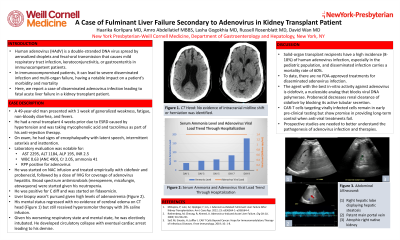Monday Poster Session
Category: Liver
P2491 - A Case of Fulminant Liver Failure Secondary to Adenovirus in Kidney Transplant Patient
Monday, October 23, 2023
10:30 AM - 4:15 PM PT
Location: Exhibit Hall

Has Audio

Haarika Korlipara, MD
New York-Presbyterian Hospital/Weill Cornell Medical College
New York, NY
Presenting Author(s)
Haarika Korlipara, MD1, Amro Abdellatief, MBBS2, Lasha Gogokhia, MD3, Russell Rosenblatt, MD, MS3, David Wan, BS, MD4
1New York-Presbyterian Hospital/Weill Cornell Medical College, New York, NY; 2Harlem Hospital Center/Columbia University, New York, NY; 3New York-Presbyterian Hospital/Weill Cornell Medical Center, New York, NY; 4Weill Cornell Medicine, New York, NY
Introduction: Human adenovirus (HAdV) is a double-stranded DNA virus that causes mild respiratory tract infection, keratoconjunctivitis, or gastroenteritis in immunocompetent patients. In immunocompromised patients, it can lead to severe disseminated infection and multi-organ failure, having a notable impact on a patient’s morbidity and mortality.
Case Description/Methods: 49-year-old man presented with 1 week of generalized weakness, fatigue, non-bloody diarrhea, and fevers. He had a renal transplant 4 weeks prior due to ESRD caused by HTN and was taking mycophenolic acid and tacrolimus as part of his anti-rejection therapy. He had signs of encephalopathy with latent speech, intermittent asterixis, and inattention. Labs were notable for AST 2295, ALT 1184, ALP 195, INR 2.5, WBC 0.63 (ANC 490), Cr 2.05. Respiratory pathogen panel was positive for adenovirus. He was started on NAC infusion and treated empirically with cidofovir and probenecid, followed by a dose of IVIG for coverage of adenovirus hepatitis. His adenovirus viral load remained greater than 1.4 billion copies/mL with no response. Broad-spectrum antimicrobials (meropenem, micafungin, atovaquone) were started given his neutropenia. He was positive for C diff and was started on fidaxomicin. Liver biopsy wasn’t pursued given high levels of adenoviremia. He remained febrile with progressing liver and renal dysfunction. His mental status regressed with no evidence of cerebral edema on CT head but still received hyperosmolar therapy with 3% saline infusion. Given his worsening respiratory state and mental state, he was electively intubated. He developed circulatory collapse with eventual cardiac arrest leading to his demise.
Discussion: Solid-organ transplant recipients have a high incidence (8-18%) of HAdV infection, especially in pediatric populations, and disseminated infection carries a mortality rate of 60%. To date, there are no FDA-approved treatments for disseminated adenovirus infection. The agent with the best in-vitro activity against adenovirus is cidofovir, a nucleoside analog that blocks viral DNA polymerase, and multiple case reports suggest decreased mortality with this treatment. Probenecid decreases renal clearance of cidofovir by blocking its active tubular secretion. CAR T cells targeting virally infected cells remain in early pre-clinical testing but show promise in providing long-term control when anti-viral treatments fail. Prospective studies are needed to better understand the pathogenesis of HAdV infection and therapies.
Disclosures:
Haarika Korlipara, MD1, Amro Abdellatief, MBBS2, Lasha Gogokhia, MD3, Russell Rosenblatt, MD, MS3, David Wan, BS, MD4. P2491 - A Case of Fulminant Liver Failure Secondary to Adenovirus in Kidney Transplant Patient, ACG 2023 Annual Scientific Meeting Abstracts. Vancouver, BC, Canada: American College of Gastroenterology.
1New York-Presbyterian Hospital/Weill Cornell Medical College, New York, NY; 2Harlem Hospital Center/Columbia University, New York, NY; 3New York-Presbyterian Hospital/Weill Cornell Medical Center, New York, NY; 4Weill Cornell Medicine, New York, NY
Introduction: Human adenovirus (HAdV) is a double-stranded DNA virus that causes mild respiratory tract infection, keratoconjunctivitis, or gastroenteritis in immunocompetent patients. In immunocompromised patients, it can lead to severe disseminated infection and multi-organ failure, having a notable impact on a patient’s morbidity and mortality.
Case Description/Methods: 49-year-old man presented with 1 week of generalized weakness, fatigue, non-bloody diarrhea, and fevers. He had a renal transplant 4 weeks prior due to ESRD caused by HTN and was taking mycophenolic acid and tacrolimus as part of his anti-rejection therapy. He had signs of encephalopathy with latent speech, intermittent asterixis, and inattention. Labs were notable for AST 2295, ALT 1184, ALP 195, INR 2.5, WBC 0.63 (ANC 490), Cr 2.05. Respiratory pathogen panel was positive for adenovirus. He was started on NAC infusion and treated empirically with cidofovir and probenecid, followed by a dose of IVIG for coverage of adenovirus hepatitis. His adenovirus viral load remained greater than 1.4 billion copies/mL with no response. Broad-spectrum antimicrobials (meropenem, micafungin, atovaquone) were started given his neutropenia. He was positive for C diff and was started on fidaxomicin. Liver biopsy wasn’t pursued given high levels of adenoviremia. He remained febrile with progressing liver and renal dysfunction. His mental status regressed with no evidence of cerebral edema on CT head but still received hyperosmolar therapy with 3% saline infusion. Given his worsening respiratory state and mental state, he was electively intubated. He developed circulatory collapse with eventual cardiac arrest leading to his demise.
Discussion: Solid-organ transplant recipients have a high incidence (8-18%) of HAdV infection, especially in pediatric populations, and disseminated infection carries a mortality rate of 60%. To date, there are no FDA-approved treatments for disseminated adenovirus infection. The agent with the best in-vitro activity against adenovirus is cidofovir, a nucleoside analog that blocks viral DNA polymerase, and multiple case reports suggest decreased mortality with this treatment. Probenecid decreases renal clearance of cidofovir by blocking its active tubular secretion. CAR T cells targeting virally infected cells remain in early pre-clinical testing but show promise in providing long-term control when anti-viral treatments fail. Prospective studies are needed to better understand the pathogenesis of HAdV infection and therapies.
Disclosures:
Haarika Korlipara indicated no relevant financial relationships.
Amro Abdellatief indicated no relevant financial relationships.
Lasha Gogokhia indicated no relevant financial relationships.
Russell Rosenblatt indicated no relevant financial relationships.
David Wan indicated no relevant financial relationships.
Haarika Korlipara, MD1, Amro Abdellatief, MBBS2, Lasha Gogokhia, MD3, Russell Rosenblatt, MD, MS3, David Wan, BS, MD4. P2491 - A Case of Fulminant Liver Failure Secondary to Adenovirus in Kidney Transplant Patient, ACG 2023 Annual Scientific Meeting Abstracts. Vancouver, BC, Canada: American College of Gastroenterology.
